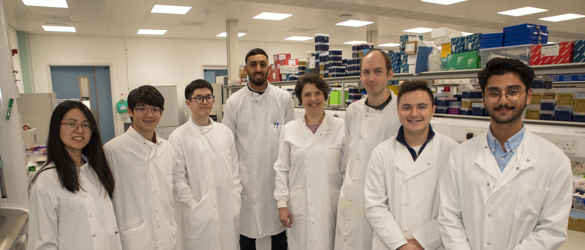Combining gene editing and anti-inflammatory therapy to treat dry AMD

Dr Jian Liu, University of Bristol - £24,946
Dry age-related macular degeneration (AMD) currently has no effective treatment, but this study is exploring a promising new two-step approach. Researchers are testing whether combining gene editing with an existing anti-inflammatory drug could protect the cells that support vision. By boosting a key protective protein in the retina, this project could open the door to a powerful new treatment strategy for dry AMD.
What is the problem?
The retinal pigment epithelium (RPE) is a vital layer of cells in the retina that supports the light-sensing photoreceptors. Its health is crucial for good vision. Research shows that levels of IRAK-M, an anti-inflammatory protein, are lower in the RPE of older people, and even lower in patients with AMD. Without enough IRAK-M, inflammation goes unchecked, damaging the RPE and, in turn, the retina.
What are they doing?
Previous studies suggest that increasing the production of IRAK-M can help protect against retinal degeneration.
Using mice that lack the IRAK3 gene (and therefore cannot produce IRAK-M), this project will induce chronic inflammation using a high-fat diet. The team will explore three potential interventions:
- Restoring the missing IRAK3 gene using gene therapy
- Reducing inflammation in the RPE using metformin, a safe, inexpensive and widely used anti-inflammatory drug
- Combining both approaches to test for enhanced protection
How can this help?
This research explores whether combining gene therapy with an anti-inflammatory treatment could slow or stop the progression of dry AMD. If successful, it could lay the foundation for a new treatment strategy that targets the root causes of inflammation and degeneration in the retina.
See our other projects
Since 1987 the Macular Society has invested around £10 million in over 100 research projects.
Explore more research
Beating macular disease through funding medical research and improving the lives of those living with macular disease.
Get the latest research news from the Macular Society
To hear about life-changing research and treatments, subscribe to our monthly enewsletter today. Together we can Beat Macular Disease.
Sign up to our free email newsletter



